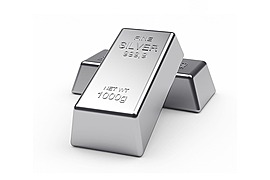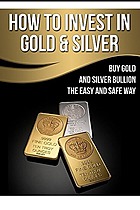
Silver
Silver has always been a valuable investment, blending features of both precious and industrial metals. A renowned monetary commodity like gold, silver has an intrinsic value in and of itself, making it ideal as a currency and store of value. Silver has also long been an alternative to traditional investments such as stocks and bonds. Over the centuries, silver popularity has grown, frequently used in jewelry, electronics, photography, life-saving medicine, and many more sectors. Due to its historic monetary link and its role as an industrial commodity, its intrinsic value and an ever-shrinking supply, silver has become a vital asset to store your wealth.
Experts - People
Andy Schectman
Ben Davies
Bill Fleckenstein
Bob Coleman
Bob Moriarty
Byron King
Carlos Sanchez
Daniel Earle
David Morgan
Doug Eberhardt
Doyle Shuler
Egon von Greyerz
Eric Muschinski
Garrett Goggin
George Milling-Stanley
Hunter Riley III
James DiGeorgia
James Turk
Jason Hamlin
Jeff Clark
Jeffrey Christian
Keith Neumeyer
Keith Weiner
Larry Lepard
Marc Faber
Maria Smirnova
Mark Yaxley
Mike Maloney
Ned Naylor-Leyland
Peter Schiff
Randy Smallwood
Rob McEwen
Ross Beaty
Sam Sommer
Sean Brodrick
Thomas Kaplan
Tom Denham
Trace Mayer
WAYS TO INVEST IN SILVER
Silver bars and coins, collectively known as bullion, can be widely purchased from reputable dealers online, pawn shops or individuals.
IRAs and physical silver.
As a way to diversify a retirement portfolio and preserve capital, investors can include silver in a self-directed IRA that allows them to broaden their alternative assets.
Another way to invest in silver is through futures contracts. These contracts obligate a holder to buy or sell a specific amount of silver at a certain price at a defined time.
Investors who want exposure to silver futures with a fund that trades like a stock can consider an ETF.
Another way to invest in silver is through stocks of silver mining companies or shares of ETFs that invest in them.
You can buy physical silver, stock in silver mining companies, silver ETFs and silver IRAs — just to name a few.
Affordable.
Silver is much more affordable than gold, making it more accessible for investors with smaller investment portfolios.
More earning potential.
Silver prices have a history of being more volatile than gold prices. With the increased risk comes an opportunity for a greater reward.
Linked to industrial demand.
Silver has many industrial uses which means its price is impacted by industrial demand. As a result, its value can increase when the value of other precious metals is decreasing.
Higher risk.
While silver offers the potential for higher returns, its price volatility also presents a greater risk for losses.
Linked to industrial demand.
A lack of silver's industrial demand can work against silver investors. Silver can decrease in value when the values of other precious metals are increasing.
Not income-generating.
Like gold, silver doesn't generate income for investors as other assets do through dividends, interest or cash flow.
If you opt for physical silver, you'll again have to cover the costs to transport, store and secure it.


















































































